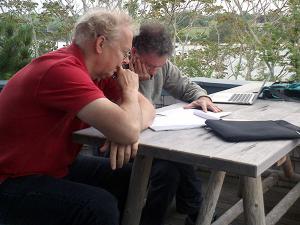Research Thrust: Theoretical Frameworks for Intelligence
 Understanding intelligence and the brain requires theories at different levels, from the biophysics of single neurons, to algorithms and circuits, to overall computations and behavior, to a theory of learning. Modeling work draws from advances in statistical learning theory, machine learning, probabilistic inference, and the biophysics of computation. Many computational methods used in these areas are described in the lectures for the other research thrusts. The lectures here provide a broad introduction to machine learning methods, including statistical learning theory. Supporting materials for the lectures and MATLAB activities presented by Lorenzo Rosasco can be found at http://lcsl.mit.edu/courses/cbmmss/.
Understanding intelligence and the brain requires theories at different levels, from the biophysics of single neurons, to algorithms and circuits, to overall computations and behavior, to a theory of learning. Modeling work draws from advances in statistical learning theory, machine learning, probabilistic inference, and the biophysics of computation. Many computational methods used in these areas are described in the lectures for the other research thrusts. The lectures here provide a broad introduction to machine learning methods, including statistical learning theory. Supporting materials for the lectures and MATLAB activities presented by Lorenzo Rosasco can be found at http://lcsl.mit.edu/courses/cbmmss/.
